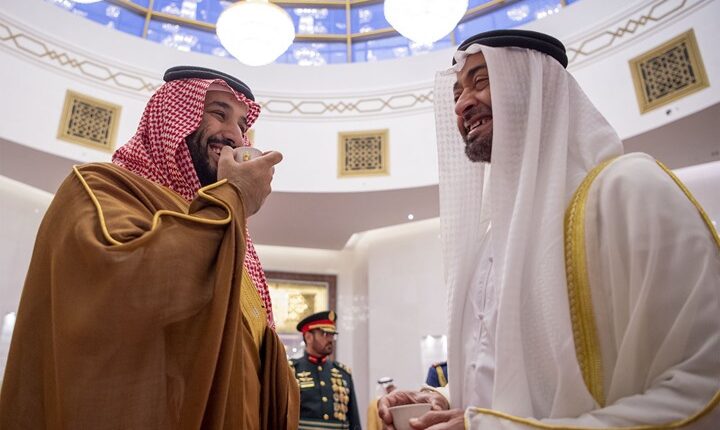Successive facts and events show that the UAE’s betrayals of the Kingdom of Saudi Arabia are countless. They express a consistent approach by Abu Dhabi to betray its supposed allies in Riyadh and weaken the KingdomKingdom.
Observers unanimously agree that the Emirati regime seeks to achieve its interests in gaining influence and expansion at the expense of Saudi Arabia in the first place.
Observers highlight that the UAE’s policy is becoming increasingly evident by deceiving Saudi Arabia and pushing it to be on the front line and attrition and then leaving it in the middle of the road to bear the consequences and losses, while Abu Dhabi reaps the gains.
The attempts of the Crown Prince of Abu Dhabi, the de facto ruler of the Emirates, Mohammed bin Zayed, to strike and weaken the Kingdom have become prominent, with clear evidence and much evidence that the ordinary observer sees before the political analyst.
Recently, the Saudi-Emirati disputes surfaced again after the Wall Street Journal revealed that the UAE (discreetly) had exported larger quantities of oil than usual since the beginning of this month. Other OPEC!
The Emirati position was identical (publicly) to the Saudi position in support of not increasing production with the beginning of the Russian-Ukrainian war, and only days passed until the Emirates began increasing production in response to America’s demands, leaving the Kingdom alone facing American and Western pressures, aligning itself with Russia.
This was not the first time that the UAE has left the OPEC + alliance, as it caused a major uproar within the oil organization by its demand last July to increase its production share to 600,000 barrels per day, in clear defiance of the Kingdom, so that the dispute continued. The Kingdom then acquiesced to the demands of the Emirates and allowed to increase production.
Over the years, the various positions of the Emirates confirmed that its policy aims to weaken, marginalize, and isolate the Kingdom from its Arab and regional surroundings.
Bin Zayed was able to achieve part of this by taking advantage of the presence of the current Saudi Crown Prince, Mohammed bin Salman, and his inability to lead the Kingdom, as he was the one who incited the Kingdom to boycott Qatar and was not enthusiastic about making peace with it.
Economically, the UAE supported Saudi Arabia’s boycott of Turkey and Iran, but at the same time, it continued its trade exchanges with Ankara and Tehran.
The UAE is the second-largest trade exchange with Iran. Its economic relations with Turkey are continuing, the latest of which was the announcement of establishing a fund to support investments in Turkey worth 10 billion dollars in late November.
The Emirati media also participated in campaigns to disparage and distort the KingdomKingdom on more than one occasion. In contrast, the Emirati tweeters close to the decision circle (as well as mercenaries and flies) ensured that the KingdomKingdom was insulted by insults, provocations, insinuations, and statements. The examples are too many to count.
The Yemeni file witnessed many plots and Emirati betrayals, including the formation of the Transitional Council, which was a dagger in the back of the coalition of legitimacy. Its seizure of Socotra with its rich resources, strategic location, and military withdrawal from Yemen in 2019 left the “Saudi ally” facing the war alone!
The matter did not stop at the UAE’s betrayal of Saudi Arabia. Still, it went beyond that to support the Houthi militia, after companies and individuals residing in the UAE contributed to transferring funds to the Houthis and contributing to the smuggling of Iranian oil through the ports of the Emirates.
The biggest scandal was after the report of the Security Council Committee of Experts revealed that a shipment of planes that had been intercepted in Marib was coming from Dubai, only to find that an Iranian company was installing it and then sending it to Yemen via Dubai, to bomb the Saudi “ally”.
It came to public declarations of an alliance with the Houthis against Saudi Arabia, as the leader of the Emirati-backed Transitional Council, Salim al-Nahdi, said: “If we had been given the option of understandings between Saudi Arabia and the Houthis, we would have chosen the Houthis, and it is not in the interest of the south to end the war and the victory of legitimacy.”
It is also remarkable that the Saudi ally alone has endured the Houthi attacks for years, while the UAE only received a few attacks, the last of which was months ago, only to be stopped after.
Despite the United Nations criminalizing the Houthis (at an Emirati request), the Houthis continued to target the KingdomKingdom, and their attacks did not extend to the UAE.



